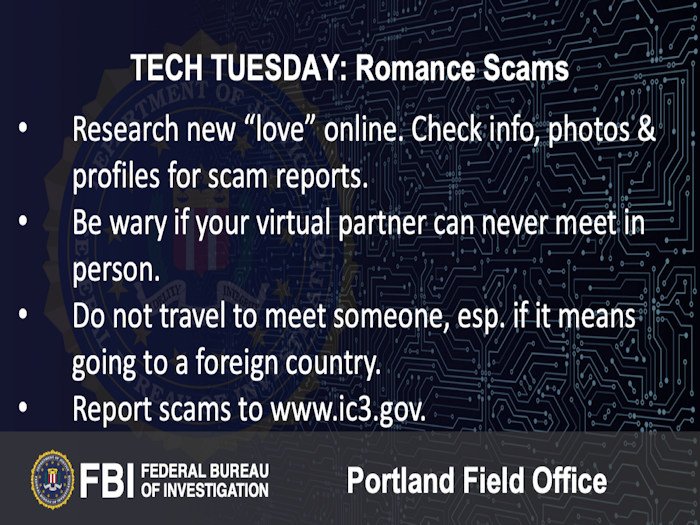Oregon FBI’s Tech Tuesday: Building a digital defense against broken hearts — or wallets

PORTLAND, Ore. (KTVZ) -- This week, the Oregon FBI's timely pre-Valentine's Day Tech Tuesday segment focuses on romance scam, and building a digital defense against broken hearts (or wallets).
One billion dollars. That’s the amount of money that the FBI’s Internet Crime Complaint Center estimates that romance fraud victims lost in 2021. And those are just the victims who reported losing their heart – and bank account – to such scammers.
While anyone can be a victim of this fraud, the bad actors are known to target women over age 40 who are widowed, divorced, elderly, and/or disabled.
The victim just wants connection and companionship. The bad guy generally wants cold hard cash.
He may be direct about it and just ask for you to send him money for some big emergency. To avoid meeting in person, romance scammers often claim to live or work in other parts of the country or world. Eventually, when they feel they have gained the trust of their victims, these criminals will ask for cash. He may say he needs money to move back home or to pay for some legal or medical emergency.
These bogus boyfriends and greedy girlfriends may want more than just money, too. They likely will try to trick victims into releasing personal info – such as birth dates and bank account numbers – that they can exploit for further scams or sell for more profit. Romance fraud victims also are very vulnerable to bad actors who want to use them to launder money.
Here are some warning signs:
• Your new love wants you to leave the dating app where you met to move to a more private messaging option, such as email or text.
• He wants you to send compromising photos or videos of yourself.
• His photo appears to be a glamour shot or her profile is too perfect.
• And, of course, there’s always the ask for money or the ask to help move money.
Here are some things you can do to avoid the pitfalls of a bad online breakup:
• Research your new love. Use online search tools to see whether that photo, name, or profile links to other scams.
• Question any relationship where your virtual soulmate always has an excuse as to why he can’t visit in person.
• Don’t travel to meet someone, especially if it involves travel to a foreign country. Such visits can end in tragedy.
• Be careful about how much information you post online. A good scammer can turn a tiny bit of detail into a very effective romantic pitch.
Losing your heart – and your bank account – in romance scams can be both emotionally and financially devastating. We ask victims, though, to come forward so that we can identify those who are committing these crimes and protect others in the process.
If you are the victim of an online fraud, you should report the incident to the FBI’s Internet Crime Complaint Center at www.ic3.gov or call your FBI local office.